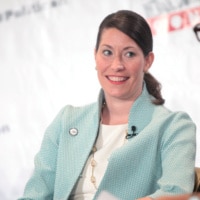An advisory group established by the Kentucky governor to gauge public interest in and support for medical marijuana is holding town halls throughout the state to gauge perception following an unsuccessful attempt at legalization in the most recent legislative session.
The Medical Cannabis Advisory Team held its most recent town hall at the Hopkinsville Community College earlier this week, previously meeting in Frankfort, Pikeville and Highland Heights. Western Kentuckians appointed to this teaminclude Julie Cantwell of Hardin County, Kristin Wilcox of Ohio County and Julie Wallace of Union County.
Cantwell — the co-founder of Kentucky Moms for Medical Cannabis and an administrator for Kentuckians for Medical Marijuana — said her son, who has drug-resistant epilepsy, has not had an absent seizure in the nearly three years since he started medical marijuana. She believes her mother, who was diagnosed with brain cancer in April, could also benefit from the treatment.
“I talk to Kentucky patients every single day, and I know that people are already using it, and they’re finding relief from PTSD, chronic pain, cancer, epilepsy, MS — it just goes on and on and on,” Cantwell said. “They just don’t want to do it illegally. They want their state to stand behind them.”
During this year’s legislative session, House Bill 136 was introduced again with the intention of allowing medical marijuana use for such conditions as cancer, chronic pain, epilepsy, multiple sclerosis, nausea or vomiting and post-traumatic stress disorder, though it failed to make headway in the Senate after passing through the House.
Beshear subsequently filed Executive Order 338 in June to establish the aforementioned medical cannabis advisory team. Prior to that, the governor had suggested he would “explore executive options” toward legalization if the legislature did not bring it to fruition.
“I want to see Kentucky finally legalize medical marijuana, and so do 70-plus, maybe even 80-plus percent of Kentuckians,” Beshear said in an April press briefing. “When the people overwhelmingly demand it, the only thing keeping it from happening are we don’t have ballot initiatives, and then the legislature right now won’t follow the will of the people.”
According to a Kentucky Health Issues Poll report, nine in 10 Kentucky adults favor legalizing marijuana for medical purposes. Rep. Jason Nemes from Louisville — who sponsored HB136 — also supports legalization, but he does not believe it is possible via an executive order.
“I don’t think we can mislead people,” Nemes said to Lex 18 News in June. “The governor is a very smart lawyer, and he knows what he’s saying is not true.”
Sen. Whitney Westerfield from Christian County formerly opposed the bill until he spoke with Nemes, noting via Twitter he still has concerns about marijuana being used as a “gateway drug” and setting a precedent by ignoring federal law.
“However, I’ve heard too many stories, in my district and out, from those long suffering and their loved ones left behind, that marijuana brought comfort and relief when nothing else worked,” Westerfield said.
Senate Majority Leader Damon Thayer from Georgetown continues to oppose the bill despite acknowledging widespread support among Kentucky adults because he believes it could be a “slippery slope” toward recreational marijuana use.
“I’ve been hearing about it for years,” Thayer said to Kentucky Education Televisionin January. “I know my constituents are for it, but this is a republic, and they elect us to go to Frankfort and make decisions on their behalf, and if they don’t like it, they can take it out on me in the next election.”
By that same token, Senate President Robert Stivers from Manchester said to Kentucky Health News in April he favors funding more research before legalizing it in Kentucky. The next month, he issued a statement taking issue with Beshear’s intent on executive order.
“He simply can’t legalize medical marijuana by executive order; you can’t supersede a statue by executive order because it’s a Constitutional separation of powers violation,” Stiver said.






